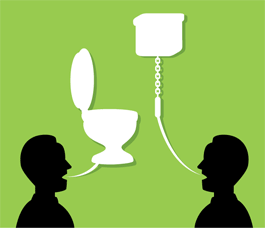
How can we see this time as anything but? When public disgrace and humiliation are but shortcuts to million-dollar book, TV, and movie deals; when a no-credibility chimera called “Talon News” is granted a seat in the White House press pool; when spinmeister Bill O’Reilly claims with a straight face that his show is a “no-spin zone”; when a war is launched and defended on blatantly fatuous claims and the perpetrators subsequently returned to office…well? Well, then we are much more than knee-deep.
So the appearance of two books on the topic of BS is more than coincidental—it is another scream from our collective unconscious that the zeitgeist is polluted and everyone should get out of the meme pool. Harry G. Frankfurt’s On Bullshit is a repurposed essay from almost 20 years ago, but its newfound relevance has earned its author invitations to appear on NPR and The Daily Show. Even the “family friendly” Washington Post felt comfortable printing its full title in a review. The other book, Your Call Is Important to Us: The Truth About Bullshit, is a tirade by Canadian professor Laura Penny. That a 76-year-old (Frankfurt) and a 30-year-old (Penny) both felt compelled to confront the same issue—and that a Canadian was moved to rant!—surely means we have entered L’Epoque Bullshit.
Frankfurt is most concerned with dissecting the word’s meaning; Penny with examining the deed’s effect. A Princeton philosophy professor emeritus, Frankfurt lays out a scholarly analysis of crapola. His tiny tome proceeds in a measured cadence, a “tentative and exploratory philosophical analysis.” Penny’s is a 256-page jeremiad about, as she calls it, “one of the growth industries of the information age.” She writes that “North Americans live at the intersection of too much and too little information,” a state that encourages them to “speak extensively about matters of which they are to some degree ignorant,” says Frankfurt. Daily life in the information society does not keep muscles toned and backs strong and the four humors in proper alignment. No, our time is taken up by such passive tasks as emailing, which, a study recently determined, actually lowers IQ. And consider, says Penny, that the service economy is built on BS, that “a long, hard day of making things is bound to produce a different sort of person than a long, hard day of greeting folks in the foyer of the Wal-Mart, asking if they want fries with their burger, or conducting phone surveys.”
Frankfurt makes an important distinction between bullshit and lies, which is that while bullshit does not have to be untrue, it is always phony. Bullshit is a process, the byproduct of a person’s uncaring attitude toward the facts at hand. And what makes bullshit the “greater enemy of the truth than lies” is that a liar actually knows and cares about the truth. He needs to know which facts he’s trying to hide. The bullshitter just wants to get over.
The person who lies on a résumé is in danger of not getting the job. But the person who bullshits effectively in the interview has a pretty good chance of getting hired. (That’s how I got all my jobs. And that’s pretty much how I keep them.) The bullshit artist cares more about what people think about him than the veracity of his own words; he values the appearance of “sincerity” over “correctness.” That we can even use the seemingly honorific term “bullshit artist” without blinking is a dispiriting example of how we’ve come to privilege spin over substance.
This onslaught of “chronic truth decay” is what bothers Penny so. Her delightful title was chosen from the “deep reservoir of bullshit phrases” because “it best exemplifies the properties native to bullshit.” That is, the attempt to “slather some nice” on aggressively un-nice situations. “Like most bullshit,” she writes, “the more times you hear it, the bullshittier it gets.”
Your Call begins with the “vanguard” BS industries—advertising and PR–in a chapter fittingly titled “Painting the Lawn Green.” Then the book moves easily through the irrational exuberance of the Internet bubble (“Only the revolutionary few can make millions by incentivizing synergy paradigms.”); the treacly justifications surrounding globalization and outsourcing; the heinous “bafflegab” of the insurance and pharmaceutical industries; the shameless corporate hucksterism of Enron, WorldCom, and the like; the imagined beauty of urban sprawl; and the media’s complicit happy-talk role in the “bullshit pandemic.”
All these users and creators of the “cozy no-think of simple bullshit” are dumbing and wearing us down to the point where we no longer see the distinction between BS about dish soap and lies about WMD. Penny arrives at the sad conclusion that we’ve moved on from being mad as hell and not going to take it anymore. We aren’t mad, or even surprised, anymore. We’re taking it and asking the “fair and balanced” news team to deliver us more.
Most of Penny’s focus is on American BS because ours is “much more ubiquitous, well-funded, and outrageous” than any other nation’s. By way of example, she explores the “Feeding Children Better” campaign launched by ConAgra. True, the mega-food conglomerate did donate tons of food for hungry kids. But as Penny points out, obesity also affects millions of children—and ConAgra is a major supplier of french fries.
The self-described crank admits that this was “an easy book to write and an impossible book to end.” But in the end, her message is simple: Shit sells. These days, to paraphrase a noted purveyor of sugar water, bullshit has become the real thing.















